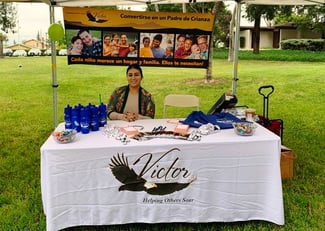 An important part of being an outstanding foster agency is finding the right resource families to connect these amazing kids with. The need for foster parents always outweighs the availability, so it’s a constant search to reach out to new people, educate them and prepare them for the role of foster parent. Evelyn Alarcon was our Resource Family Recruiter and she was always out in the community, networking and meeting people at events to tell them about what we did and why they should consider fostering through Victor. While we no longer provide foster services, we remain dedicated to supporting you by connecting you with foster care agencies in your region to access the resources you need.
An important part of being an outstanding foster agency is finding the right resource families to connect these amazing kids with. The need for foster parents always outweighs the availability, so it’s a constant search to reach out to new people, educate them and prepare them for the role of foster parent. Evelyn Alarcon was our Resource Family Recruiter and she was always out in the community, networking and meeting people at events to tell them about what we did and why they should consider fostering through Victor. While we no longer provide foster services, we remain dedicated to supporting you by connecting you with foster care agencies in your region to access the resources you need.
Evelyn meets people with a variety of ideas about foster care. Some already know a little about fostering or have even considered it, while others may have never even though of it as an option. There are a lot of misconceptions about fostering and Evelyn tries to give people a more informed view of what fostering is all about. We asked Evelyn about her experience talking to potential foster parents, below are some key takeaways.
5 Misconceptions About Qualifying to Foster
When Evelyn met people and told them about Victor as a foster parent agency their reaction is often “Oh that's really nice, but I wouldn't be able to be a foster parent.” Evelyn digs a little deeper and asks them why they think that. There are a variety of reasons but they are almost always a mistaken understanding about what’s actually required to foster.
"I don’t own a home" – There is no requirement to own a home. Renting a home or apartment is fine, as long as you are stable and the home has room to properly accommodate the child.
"I’m not married" – This is a very common misconception. Single or unmarried people can foster. There is no requirement to have a partner or spouse.
"I already have biological kids in the house" – Not a problem. Many foster parents also have their own biological children. It's also important to include your biological children in the preparation to welcome a foster child into the family.
"I don’t make enough money" – You don’t have to be rich to be a foster parent. You do need to be financially stable and able to accommodate the addition of another person in the house, but you will receive a reimbursement from the state to help offset the costs of childcare. You will have to provide proof of income and potentially documentation about your monthly expenses so that the agency can make sure that the placement of a foster child won’t be a major hardship on the household budget.
"I’m undocumented" – In California, undocumented immigrants, especially family members or close friends of a child can be approved as foster parents. Senate Bill 1064 was passed in 2012 to help expand the available options to recruit foster parents to meet the growing need in the state. Agencies can use a foreign passport or other documentation to run a background check and get approval.
After Evelyn addresses all these misconceptions she finds that people will start considering fostering more seriously. As she digs deeper she may have to address other misconceptions or stereotypes. Occasionally Evelyn meets people who have the idea that being a foster parent is like a job that you would apply for. There is a negative stereotype out there that foster parents just do it for the money. This could not be further from the truth. First of all, the reimbursement is not that much money. Additionally, the foster parents have to provide proof that the money is being spent to help the child. State law requires that a certain amount of that money goes to essential things for the child and every month receipts are required as proof.
The Big Goal
There is a huge need right now for more people to open their homes and hearts to fostering.
For more information on becoming a foster parent, contact a local foster agency to discover the resources and support they offer. We're here to assist you in any way we can, ensuring that you have what you need to create a loving and stable home for children in your care.
For more information about our programs and how we can help, visit our website or contact us today.
